During one of my wild web-surfing stints, the kind where one page leads you to another and then onto another and yet another, until you forget what it was you were initially looking for, or how you came across the page that you find yourself on at that moment, I landed on an article in the Huffington post by Alex Pattakos. I didn't know who he was when I initially read the article, but I did like the sound of his name: Pattakos reminded me of some of the children I taught when I was working in Paleohora where it was a familiar surname, and in Crete, we have this rather annoying overly nepotistic habit of remembering people by the name they carry and all the family traits that the name implies.
The article was quite short, but there was one brief paragraph in this text that made an instant impression on me:
"... [If you] haven't figured out the ethnic origin of my last name, 'Pattakos,' let me help you. It's Greek. And importantly, it's Cretan! Proudly, I can also say that the Pattakos clan, whose roots are deeply embedded in the "soul" of Crete, has been actively engaged in the political arena throughout Crete's history, long before it became an official part of Greece...."
This statement makes a profound impact; Crete, a small island in the Mediterranean Sea (in actual fact, the fifth largest in the Mediterranean), with about 350,000 inhabitants living on 8,335 square kilometres of space, is being singled out from Greece, an opinion that has also grown on me over the years while I have been living here. It reminded me of a very poignant moment in my life, one which I do not often recall these days. This moment in my life had been packed away in my mind all this time; Alex's words flushed it all back up to the surface.
Having left New Zealand in September of 1991, I arrived in Greece, after spending three months travelling through Western Europe. I had already been warned about what Athens was like: dusty, hot, crowded and polluted; I found it no different. Two weeks later in early October, I boarded the overnight ferry boat from the port of Pireas to Crete. When I woke up the next morning, I could not believe what I was seeing: I instantly fell in love with the sight of the green hills visible from Souda Bay, the ferry port of Hania. After my first visit into the town, I wondered how it was that I had found paradise; surely this place should have been found out by others before me long ago. How on earth did my own ancestors bear to leave it in the first place?
Alex Pattakos may be American, but he takes great pride in his grandparents' island origins which are steeped in the history of human civilisation. He even shares the facial features of my own ancestors; anyone who knows enough of the Cretan race will instantly recognise his appearance as Cretan: his height, the white hair and the thick moustache are unmistakeable characteristics of a veritable Cretan face (in fact, he looks incredibly like my dad). Alex connected with his family roots in Crete only relatively recently, and even got the chance to dance like Zorba the Greek, a dance that he says:
"helped my ancestors and their fellow Cretans not become 'prisoners of their thoughts,' even when they were prisoners of foreign powers." (In her past, Crete has been under Venetian, Egyptian and Turkish rule before gaining independence at the end of the nineteenth century and joining the newly formed Greek state.)
The evening started off like this... and ended like this.
At the end of the article, Alex invited readers to share their experiences about their kind of "dance", if and how they have connected with their ancestors, and how such a connection has been meaningful for them. His origins also form a central theme in his book Prisoners of our Thoughts. He was visiting Crete recently, and I had the chance to meet him in person. Our common heritage put great meaning into our life, despite the different paths we took to find it. In essence, our roots play similar roles in our life. If we had not found them and made a tangible link to them - of which, as Alex recognises, even food plays an important part, after experiencing his first Greek Easter on the island - we would still be feeling that sense of emptiness that overtakes one when there is nothing to fall back on, when the material world loses its importance and contentment can only be reached by a tangible link to the land and people that breathed life into you.
Economic crisis? Personal crisis? Identity crisis?
Forget the material world and come and solve all your problems here.
A meal at Monastiri by the old harbour near the former mosque, with a view of the lighthouse in the former Venetian port, was a perfect place to talk about how our present life is linked to our past, how we both eventually connected to our roots and how ingrained they are in us, whether we (are lucky to) live in Crete or far away from it. I've been to Monastiri restaurant many times and have never been disappointed. (In fact, this is the only place I go to at the harbour, if that is any endorsement.)Forget the material world and come and solve all your problems here.

Monastiri taverna at the Venetian harbour in Hania, the dome of the former mosque barely showing in the background.
At my instigation, Alex and his wife Elaine Dundon tried (and loved wholeheartedly) marathopita and boureki; apart from well-cooked traditional Cretan meals, Monastiri also serves monastic twists (as the name of the restaurant suggests) with a shocking appeal, such as: Sin, The Nun's Mistake and Little Devil. The meal finished with some cheese and honey pies (Sfakianes pites) and a shot of tsikoudia, the locally brewed fiery alcoholic spirit.
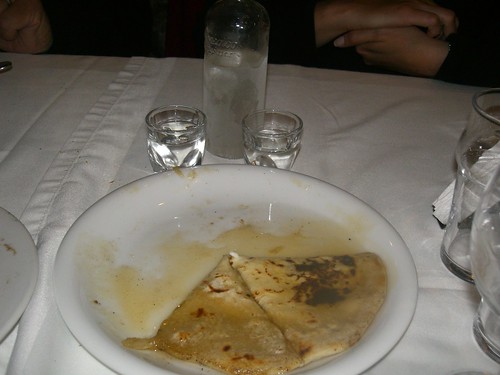
Sfakianes pites and ice-cold raki (tsikoudia)
The evening was cool and calm, the harbour was full of people; as the early diners (the tourists) left their seats, the restaurants would fill up with more hungry people (Greeks always dine much later than the tourists). A relaxed atmosphere always whets the apetite. The tables at the edge of the harbour were all full, as everyone wanted to enjoy the best view of the eternal icon of Venetian harbour of Hania, the lighthouse, which never fails to please. The view from the restaurant and the peaceful atmosphere of the people strolling around the port in the middle of the evening was enough for Alex and me to put all the meaning we needed into our life, a meaning that cannot be expressed in words; it was as if this place, our island, had helped us to make peace with ourselves.
Thanks to Global Greek World; I finally realised it was this site that led me to Alex!
Thanks to Global Greek World; I finally realised it was this site that led me to Alex!
©All Rights Reserved/Organically cooked. No part of this blog may be reproduced and/or copied by any means without prior consent from Maria Verivaki.
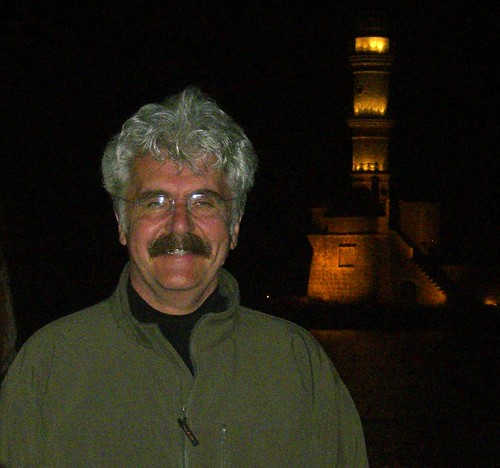
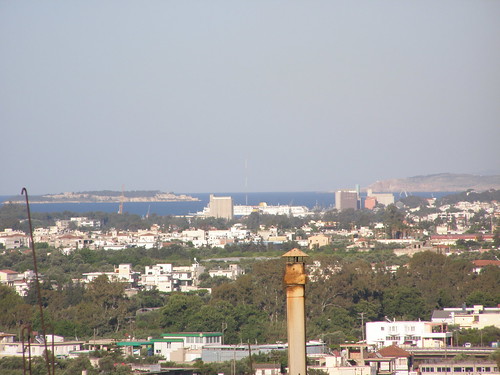
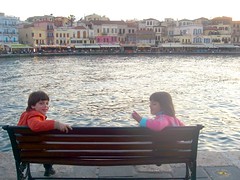
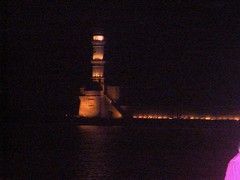
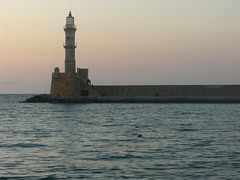
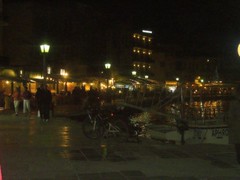
This is close to my own heart - I was born in the Philippines but have spent all but 5 years of my life in America and Canada. I have been trying to reconnect with my heritage through food and it is the reason that my own food blog often refers back to Filipino themes. I am American by citizenship but the Philippines draws me more and more despite the distance and years.
ReplyDeleteUna fatsa, una ratsa.
ReplyDeleteAll roads eventually lead to Crete...
ReplyDeleteIslanders always see themselves as Islanders first and then (fill in the country) second. That is as true of Greece as it is of Estonia where I live. You are Xaniotissa or Kritika while I am Saarlane. I felt that very powerfully when I lived in Xania. It nearly killed me to leave there.
ReplyDeleteThe photo of the ferry boat brought back such memories; steaming into the bay at sunrise with the dolphins, while the mountains drop into the sea.
Having seen previously that picture with your dad by the big grill, i immediately thought this was a more recent picture of him (!)
ReplyDelete"is being singled out from Greece, an opinion that has also grown on me over the years while I have been living here."
Sad but true...Other islands are singled out as well. While the country is small, has a lot of islands and there are many opportunities for novel enterprises there seems to be an almost organised effort to quench new efforts :-(
Take for example the seaplanes operating from Kerkyra to Ioannina Lake and (a small number of) other destinations, the guy went through hell to set the company up and his initial plan was to expand and connect the islands through "island-hopping" flights....Instead he has been limited to a small number of regular flights between Kerkyra and Ioannina (Contradicting regulations, bureaucracy :-/ )
Beautiful! Your post reminds me of a phrase from a Terry Pratchett book (Hristina might like to read about Tiffany Aching). It says "She tells the hills who they are, and the hills tell her back who she is. [...] She has these hills in her bones. "
ReplyDeleteBeautiful!!! Thank you for sharing, you have a way of making me travel with you in Kriti. Thank you...:p
ReplyDeleteI've told you before I don't have any back ground from Kriti but there is something I can not explain that attracts me to this Island. I have Never visited. I hope to some day!
Maria: I enjoy reading your blog.
ReplyDeleteWhen it comes to family names one needs to be careful; most Greeks when they hear the name Pattakos what they think of is Stylianos Pattakos and the Greek military junta.
good point anonymous - that is what people who know the history of greece well and remember the times of the junta (whether fondly or not) will think.
ReplyDeletei came to live in greece in 1991, and my knowledge of greek history was clouded by the ancient rather than the modern Greece (eg I knew the names of the 12 gods), and most young people in greece today will not grow up with any knowledge about the infamous junta - so the name will eventually pass into history.
i purposely avoided using pinks to the junta, as it makes my article political rather than romantic!
(for the record, the junta personality was also a veritable cretan)
Sfakianes pites !!! ouaouuuuu...I wish I had one in front of me...or two...or more !!
ReplyDeleteGreat post, Maria. It always, always intrigues and amazes me how folks have the courage to follow their dreams and relocate from the home of their birth. I only moved 2000 miles from home, but am still in the same country. It makes me appreciate all the more the joys and sorrows of my mom's family relocating here from Italy. I thought of you today when we were at the library. In the children's section, they have a separate section of children's books written in Greek. Of course, I had to pick up a couple and browse through them. Anyway ... it made me think of you! Have a great week!
ReplyDelete8elw na paw sth 8eia mou sta askufou gia pites me meli !!!!!!!!!! kai ston iordani gia bougatsa !!!!!!!!! vaso
ReplyDeleteThere is no meaning in life without meaning... Another excellent post!!
ReplyDeleteI loved reading this. I love your view also!!! Now, I'm going to make gigantes...using your recipe!
ReplyDeleteThat was a really interesting post. And the picture of the taverna with the dome of the old mosque in the background is fantastic!
ReplyDeleteWhat a wonderful experience! Sounds like you had a wonderful time ... thanks for another great post!
ReplyDeleteI love all your posts about your life, they are so great!
ReplyDeletePetros hit the roof when he came home and saw a book by Pattakos. He was in the Greek navy during the junta.
ReplyDeleteGreeks are not that forgiving by nature.
Hopefully it was the Global Greek World that took you there!!! Good to see you met Alex Pattakos, thought his article was really worth mentioning...wrote to him but he hasn't replied yet...
ReplyDeleteyes indeed - thanks for helping me to remember!!!
ReplyDeleteI apologize, Maria, for not visiting your site and seeing the various comments that have been posted in response to your article about our time together in Hania. Very interesting! And I just connected with the Global Greek World site too! I greatly appreciate the thoughts that were shared, especially those about my family name! I spent some quality time with my great-uncle, Stylianos, before returning to the USA. All I can say is (1) don't believe everything you hear and (2) don't be or become a "prisoner of your thoughts!" Efharisto! Alex Pattakos (Email: alex@prisonersofourthoughts.com; Follow on Twitter: www.twitter.com/DrMeaning)
ReplyDeleteso true alex.
ReplyDeleteif we stick to the name, then we will be biased against a person before we even meet them properly (ie converse with them).
i alluded to the prejudice of the name-tag when i mentioned that nepotistic habit of remembering people by the name they carry and all the family traits that the name implies...